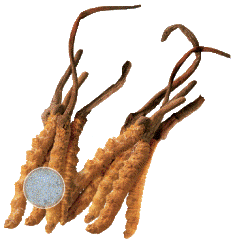SUN TEN Quarterly Newsletter Summer 2012: Modern Research on Cordyceps (Dong Chong Xia Cao)
Modern Research on Cordyceps (Dong Chong Xia Cao)
by Sien-Hung Yang M.D. Ph.D.
Director and Associate Professor, Department of Chinese Medicine,
Many people have been taking Cordyceps (Dong Chong Xia Cao), a Chinese medicinal, as a dietary supplement for long period of time. However, there has not been much research done to learn of the impact it may have on the human immune system, or of any adverse side-effects it may cause following long-term consumption. It is absolutely necessary for the Traditional Chinese Medical profession to be actively involved in such research to better understand the medicinal effect of Cordyceps, as well as, its safety. This knowledge will be very helpful for those who are consuming it and the doctors who prescribe it.

Cordyceps is an endoparasitoid of the parasitic Clavicipitaceae fungi Cordyceps sinesis (Berk.) Sacc. found on the Hepialidae insect’s sporocarp and its larvae. It is a tonic herb with multiple pharmacological effects, as it contains more than ten different types of amino acids and trace minerals. Cordyceps was described in ancient Traditional Chinese Medicine (TCM) literature to supplement deficiency, boost essence, relieve cough, and dissolving phlegm (1). There have been many research studies done on Cordyceps over recent years. Cordyceps is reported to have immune-regulating abilities (2). It strengthens the engulfing action of macrophages, increases the T-cell levels in the surrounding blood and spleen, and it promotes IL-2 production by the lymph cells in animal experiments (3). It enhances the activity of natural killer cells in animal experiments and leukemia patients (4). As for the effect on smooth muscles, Cordyceps was reported to have the function to promote dilation in the smooth muscles from isolated guinea pig tracheas. In addition, it has multiple physiological functions that include the promotion of platelet aggregation, lowering of cholesterol, anti-inflammation, sedation, anticancer, male hormone-like function, anti-bacteria, anti-viral, and an ability to dissolve phlegm and calm panting (1). In rats, Cordyceps has been shown to have specific cardiovascular and hematological benefits including an anti-arrhythmia effect, the ability to lower blood pressure, slow the heart rate, shorten the ST segment found in myocardial ischemia, reduce oxygen consumption, and inhibit thrombosis. Qing-Hai Cordyceps preparation lowers the cholesterol and triglyceride levels in serum and increases nutritional blood flow in the spleen. These mechanisms were found occur due to the increased activity of lipoprotein lipase and decreased micro viscosity of the membranes of red blood cells, from diet-induced obese rats, which changed the rheology of the blood to increase its fluidity. In regards to the liver, it reduces ascites and has a specific remedial effect on increased plasma albumin in post-hepatitis cirrhosis patients with ascites. In addition, when used to treat diseases such as chronic hepatitis B, it regulates immune functions and strengthens the immune mechanisms that eliminate the hepatitis B virus.
Join our member to get full-text article! Join Free!
[Other Effects of Cordyceps] for members only